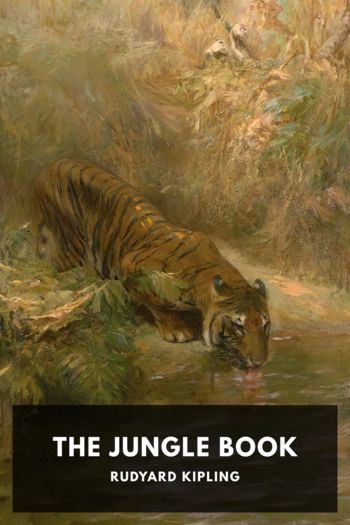The Jungle Book by Rudyard Kipling (best novels ever TXT) 📕

- Author: Rudyard Kipling
Book online «The Jungle Book by Rudyard Kipling (best novels ever TXT) 📕». Author Rudyard Kipling
Then an elephant trumpeted, and they all took it up for five or ten terrible seconds. The dew from the trees above spattered down like rain on the unseen backs, and a dull booming noise began, not very loud at first, and Little Toomai could not tell what it was; but it grew and grew, and Kala Nag lifted up one fore foot and then the other, and brought them down on the ground—one-two, one-two, as steadily as trip-hammers. The elephants were stamping altogether now, and it sounded like a war-drum beaten at the mouth of a cave. The dew fell from the trees till there was no more left to fall, and the booming went on, and the ground rocked and shivered, and Little Toomai put his hands up to his ears to shut out the sound. But it was all one gigantic jar that ran through him—this stamp of hundreds of heavy feet on the raw earth. Once or twice he could feel Kala Nag and all the others surge forward a few strides, and the thumping would change to the crushing sound of juicy green things being bruised, but in a minute or two the boom of feet on hard earth began again. A tree was creaking and groaning somewhere near him. He put out his arm and felt the bark, but Kala Nag moved forward, still tramping, and he could not tell where he was in the clearing. There was no sound from the elephants, except once, when two or three little calves squeaked together. Then he heard a thump and a shuffle, and the booming went on. It must have lasted fully two hours, and Little Toomai ached in every nerve; but he knew by the smell of the night air that the dawn was coming.
The morning broke in one sheet of pale yellow behind the green hills, and the booming stopped with the first ray, as though the light had been an order. Before Little Toomai had got the ringing out of his head, before even he had shifted his position, there was not an elephant in sight except Kala Nag, Pudmini, and the elephant with the rope-galls, and there was neither sign nor rustle nor whisper down the hillsides to show where the others had gone.
Little Toomai stared again and again. The clearing, as he remembered it, had grown in the night. More trees stood in the middle of it, but the undergrowth and the jungle-grass at the sides had been rolled back. Little Toomai stared once more. Now he understood the trampling. The elephants had stamped out more room—had stamped the thick grass and juicy cane to trash, the trash into slivers, the slivers into tiny fibers, and the fibers into hard earth.
“Wah!” said Little Toomai, and his eyes were very heavy. “Kala Nag, my lord, let us keep by Pudmini and go to Peterson Sahib’s camp, or I shall drop from thy neck.”
The third elephant watched the two go away, snorted, wheeled round, and took his own path. He may have belonged to some little native king’s establishment, fifty or sixty or a hundred miles away.
Two hours later, as Petersen Sahib was eating early breakfast, his elephants, who had been double-chained that night, began to trumpet, and Pudmini, mired to the shoulders, with Kala Nag, very footsore, shambled into the camp.
Little Toomai’s face was gray and pinched, and his hair was full of leaves and drenched with dew; but he tried to salute Petersen Sahib, and cried faintly: “The dance—the elephant-dance! I have seen it, and—I die!” As Kala Nag sat down, he slid off his neck in a dead faint.
But, since native children have no nerves worth speaking of, in two hours he was lying very contentedly in Petersen Sahib’s hammock with Petersen Sahib’s shooting-coat under his head, and a glass of warm milk, a little brandy, with a dash of quinine inside of him, and while the old hairy, scarred hunters of the jungles sat three-deep before him, looking at him as though he were a spirit, he told his tale in short words, as a child will, and wound up with:
“Now, if I lie in one word, send men to see, and they will find that the elephant-folk have trampled down more room in their dance-room, and they will find ten and ten, and many times ten, tracks leading to that dance-room. They made more room with their feet. I have seen it. Kala Nag took me, and I saw. Also Kala Nag is very leg-weary!”
Little Toomai lay back and slept all through the long afternoon and into the twilight, and while he slept Petersen Sahib and Machua Appa followed the track of the two elephants for fifteen miles across the hills. Petersen Sahib had spent eighteen years in catching elephants, and he had only once before found such a dance-place. Machua Appa had no need to look twice at the clearing to see what had been done there, or to scratch with his toe in the packed, rammed earth.
“The child speaks truth,” said he. “All this was done last night, and I have counted seventy tracks crossing the river. See, Sahib, where Pudmini’s leg-iron cut the bark of that tree! Yes; she was there too.”
They looked at each other, and up and down, and they wondered; for the ways of elephants are beyond the wit of any man, black or white, to fathom.
“Forty years and five,” said Machua Appa, “have I followed my lord, the elephant, but never have I heard that any child of man had seen what this child has seen. By all the Gods of the Hills, it is—what





Comments (0)